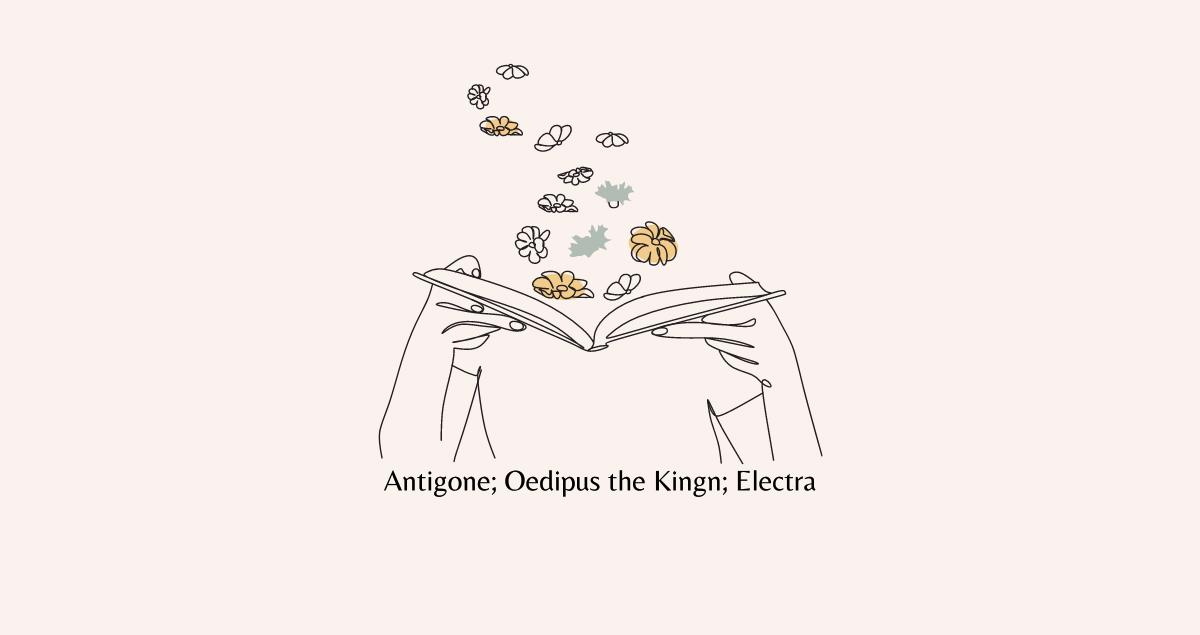Antigone; Oedipus The King; Electra is about family tragedies and the complexities of fate. It delves into the lives of Greek mythological characters, exploring themes of honor, loyalty, and the consequences of one's actions. The intertwined stories of Antigone, Oedipus, and Electra reflect the profound impact of destiny on human lives.
Table of Content
Antigone; Oedipus The Kingn; Electra Book Summary
Oedipus The King follows the story of Oedipus, who solves the riddle of the Sphinx to become king and unknowingly fulfills a prophecy by killing his father and marrying his mother. The truth is revealed, leading Oedipus to gouge out his eyes and be exiled. His curse extends to his children, who endure their own tragic fates.
Antigone, Oedipus's daughter, defies her uncle King Creon's decree by burying her traitorous brother Polyneices. She embraces the honor of her family despite the consequences. Ismene initially declines to help but later seeks to share Antigone's punishment. The sisters' loyalty contrasts sharply with Creon's pride and inflexibility.
Electra mourns the death of her father, Agamemnon, and despises her mother, Clytemnestra, and her mother's lover, Aegisthus. With her brother, Orestes, she plans and executes their mother's and Aegisthus's murder, thus avenging Agamemnon's death and restoring honor to their house.
Antigone's act of civil disobedience pits familial duty against state law, illustrating the conflict between individual conscience and political authority. Her steadfastness in facing death highlights the consequences of choices and the importance of personal integrity.
Creon's hubris leads to the deaths of Antigone, Haemon (his son and Antigone's betrothed), and Eurydice (his wife). He finally acknowledges his folly, but it is too late. The tragic outcome emphasizes the perils of unchecked power and the need for wise and just leadership.
Electra's desperate longing for justice and retribution consumes her. While her actions might be seen as justified in the context of Greek honor culture, they ultimately perpetuate the cycle of violence and destruction within her family.
The stories of these characters are tied together by the relentless pursuit of destiny and the inescapable impact of their births and parentage.
Their lives are a testament to the enduring struggle between free will and predestination, highlighting the intricate web of fate that binds their actions and their consequences.
Each character's choices reflect the broader themes of honor, pride, and the complex interplay of familial and societal obligations.
Throughout the tales, the Greek chorus serves not only as a narrative device but also as a reflection of the community's values and a reminder of the timeless lessons contained within the tragedies.
These stories are an exploration of the human condition, with its capacity for both nobility and folly, its relentless search for meaning, and the eternal struggle against the whims of the King.
Antigone; Oedipus The Kingn; Electra Quotes
- Time as it grows old teaches all things.

- All men make mistakes, but a good man yields when he knows his course is wrong, and repairs the evil. The only crime is pride.

Antigone; Oedipus The Kingn; Electra Ending Explained
At the end of Antigone, the title character is entombed alive, as punishment for her defiance of King Creon. Haemon, her betrothed, and Creon's son, commits suicide in anguish over her fate. Queen Eurydice, Creon's wife, hearing of her son's death, also takes her own life, cursing Creon. The king is left in despair, having lost his son and wife in a single moment.
Characters in book Antigone; Oedipus The Kingn; Electra
- Oedipus: The tragic hero of Oedipus The King, who unknowingly fulfills a prophecy that he will kill his father and marry his mother.
- Antigone: The daughter of Oedipus and Jocasta, who stands for her beliefs in burying her brother, despite King Creon's decree.
- Creon: Oedipus's brother-in-law and ruler of Thebes, whose decisions lead to tragic consequences, both in Oedipus The King and Antigone.
- Ismene: Antigone's sister, who initially refuses to help Antigone bury their brother, fearing Creon's punishment.
- Electra: The daughter of Agamemnon and Clytemnestra, who seeks revenge for her father's murder.
- Clytemnestra: The wife of Agamemnon and mother of Electra, who betrays her husband and is subsequently killed by her children in some versions of the story.
- Aegisthus: Clytemnestra's lover, and in some versions, her co-conspirator in the murder of Agamemnon.
- Chorus: A group that comments on the main action in Antigone and Electra, often representing the views of Theban elders or Mycenaean women.
Key Lessons
- Honor Over Law: Upholding personal values and honor may sometimes conflict with obeying the law or authority.
- Hubris Leads to Tragedy: Overwhelming pride and arrogance can blind individuals to their own faults, leading to personal and societal ruin.
- The Importance of Family: Despite its complexities, family loyalty and duty can shape one's identity and choices.
- Justice and Revenge: The pursuit of justice and the desire for revenge are powerful motivators that can either heal or perpetuate cycles of violence.
- Acceptance of Fate: Coming to terms with one's destiny can lead to a deeper understanding of the world and one's place in it.
My Personal Opinion
Is Antigone; Oedipus The King; Electra worth reading? I would say yes. I found the intricate web of fate and the poignant exploration of human suffering truly compelling. The stories are rich with themes that resonate throughout the ages.
I was moved by the characters' struggles and admired their unwavering convictions, particularly in the face of such despair. The plays' impact lies not just in their tragic narrative, but in the profound questions they raise about the nature of humanity.
I would recommend this book to those who enjoy classical literature and who are interested in delving into the depths of the human psyche. It is a powerful reminder of the enduring legacy of Greek tragedy and its timeless relevance to the human experience.

